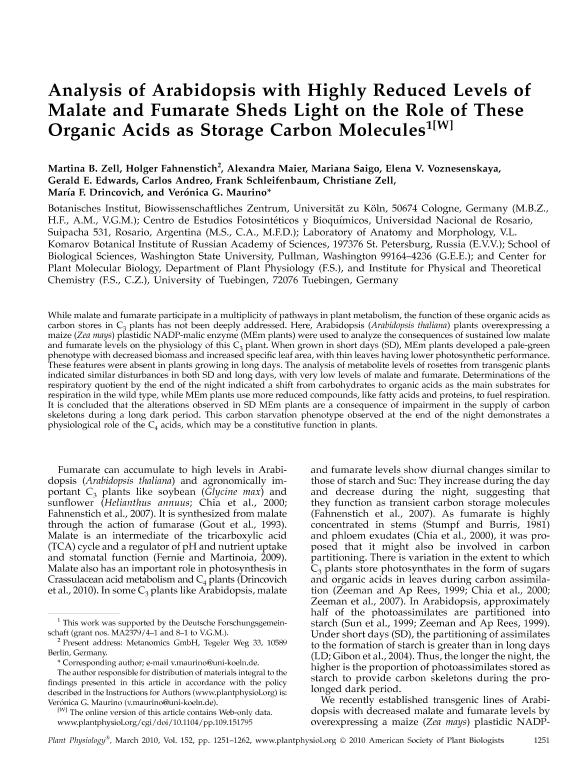Artículo
Analysis of Arabidopsis with highly reduced levels of malate and fumarate sheds light on the role of these organic acids as storage carbon molecules
Zell, Martina B.; Fahnenstich, Holger; Maier, Alexandra; Saigo, Mariana ; Voznesenskaya, Elena v.; Edwards, Gerald E.; Andreo, Carlos Santiago
; Voznesenskaya, Elena v.; Edwards, Gerald E.; Andreo, Carlos Santiago ; Schleifenbaum, Frank; Zell, Christiane; Drincovich, Maria Fabiana
; Schleifenbaum, Frank; Zell, Christiane; Drincovich, Maria Fabiana ; Maurino, Verónica G.
; Maurino, Verónica G.
 ; Voznesenskaya, Elena v.; Edwards, Gerald E.; Andreo, Carlos Santiago
; Voznesenskaya, Elena v.; Edwards, Gerald E.; Andreo, Carlos Santiago ; Schleifenbaum, Frank; Zell, Christiane; Drincovich, Maria Fabiana
; Schleifenbaum, Frank; Zell, Christiane; Drincovich, Maria Fabiana ; Maurino, Verónica G.
; Maurino, Verónica G.
Fecha de publicación:
03/2010
Editorial:
American Society Of Plant Biologist
Revista:
Plant Physiology
ISSN:
1532-2548
Idioma:
Inglés
Tipo de recurso:
Artículo publicado
Clasificación temática:
Resumen
While malate and fumarate participate in a multiplicity of pathways in plant metabolism, the function of these organic acids as carbon stores in C3 plants has not been deeply addressed. Here, Arabidopsis (Arabidopsis thaliana) plants overexpressing a maize (Zea mays) plastidic NADP-malic enzyme (MEm plants) were used to analyze the consequences of sustained low malate and fumarate levels on the physiology of this C3 plant. When grown in short days (SD), MEm plants developed a pale-green phenotype with decreased biomass and increased specific leaf area, with thin leaves having lower photosynthetic performance. These features were absent in plants growing in long days. The analysis of metabolite levels of rosettes from transgenic plants indicated similar disturbances in both SD and long days, with very low levels of malate and fumarate. Determinations of the respiratory quotient by the end of the night indicated a shift from carbohydrates to organic acids as the main substrates for respiration in the wild type, while MEm plants use more reduced compounds, like fatty acids and proteins, to fuel respiration. It is concluded that the alterations observed in SD MEm plants are a consequence of impairment in the supply of carbon skeletons during a long dark period. This carbon starvation phenotype observed at the end of the night demonstrates a physiological role of the C4 acids, which may be a constitutive function in plants.
Palabras clave:
Organic Acids
,
Carbon Metabolism
,
Dark Metabolism
,
Short Days
Archivos asociados
Licencia
Identificadores
Colecciones
Articulos(CEFOBI)
Articulos de CENTRO DE EST.FOTOSINTETICOS Y BIOQUIMICOS (I)
Articulos de CENTRO DE EST.FOTOSINTETICOS Y BIOQUIMICOS (I)
Citación
Zell, Martina B.; Fahnenstich, Holger; Maier, Alexandra; Saigo, Mariana; Voznesenskaya, Elena v.; et al.; Analysis of Arabidopsis with highly reduced levels of malate and fumarate sheds light on the role of these organic acids as storage carbon molecules; American Society Of Plant Biologist; Plant Physiology; 152; 3; 3-2010; 1251-1262
Compartir
Altmétricas



